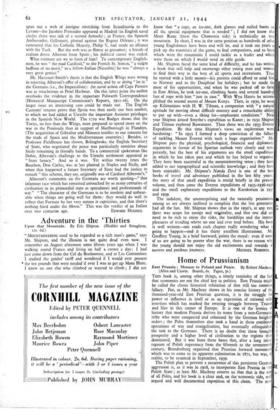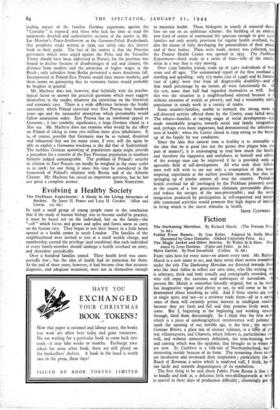Home of Prussianism •
Tins book is, among other things, a timely reminder of the fact that economics are not the chief key to politics. East Prussia might
be called the classic historical refutation of that still too common fallacy. For, as Mr. Machray shows in his concise history of the thousand-year-old East Prussian question, it is the struggle for power or influence in itself or as an expression of national self assertion which has marked the swaying struggle between Teuton and Slav in this corner of Europe. It is one of the ironies d history that modern Prussia derives its name from a non-Germanic tribe who were conquered and colonised by the German knightly orders ; the Poles themselves also took a hand in these combined operations of war and evangelisation, but eventually relinquished the task to the Germans. There is no doubt that these brought prosperity and a higher level of civilisation to the regions they dominated. But it was from these bases that, after a long inter- regnum of Polish supremacy from the fifteenth to the seventeenth century, • Brandenburg organised that Prussian forward movement which was to come to its apparent culmination in 1871, but was, In reality, to be resumed in September, 1939.
The Polish plan to prevent a recurrence of this persistent German aggression is, as it was in 1918, to incorporate East Prussia in the Polish State ; at least Mr. Machray assures us that that is the aim of all Poles, and his book is a clear and, on the economic side, well argued and well documented expo44,ition of this claim. The mis- leading nature of the familiar German arguments against the " Corridor " is exposed; and those who lack the time to read the immensely detailed and authoritative account of the matter in Mr. Ian Morrow's Peace-Settlement in the German-Polish Borderlands, that prophetic study written in 1936, can safely take this shorter book as their guide. The fact of the matter is that the Prussian grievances which were urged against the Poles and the Versailles Treaty should have been addressed to Nature, for the province was bound to decline because of disadvantages of soil and climate, the distance from markets and the attraction of higher wages in the Reich ; only subsidies from Berlin prevented a more disastrous fall. Incorporated in Poland East Prussia would have nearer markets, and there seems no gainsaying that its economic future would probably be brighter in general.
Mr. Machray does not, however, deal faithfully with the psycho- logical factor or answer the practical questions which must suggest themselves to the reader, whatever his conviction on the historical and economic case. There is a wide difference between the feudal suzerainty which Poland exercised over East Prussia four hundred years ago and the nationalist absorption which presumably would follow annexation today. East Prussia has an emotional appeal to Germans ; it has symbolic significance, a large German island in a Slav sea. Mr. Machray does not examine what would be the effect on Poland of taking in some two million more alien inhabitants. It is, of course, possible that Germany may be so ruined, disunited and exhausted that not for many years, if ever, will she again be able to exploit a Germania irredenta as she did that of Sudetenland. The ruthless German uprooting of populations again might provide a precedent for a transfer of the East Prussian population in numbers hitherto judged unmanageable. The problem of Poland's security in relation to East Prussia can hardly be weighed in the same scales as in 1918 ; for one thing, it must this time be considered in the framework of Poland's relations with Russia and of the Atlantic Charter. Mr. Machray has raised an important question, but he has



























 Previous page
Previous page